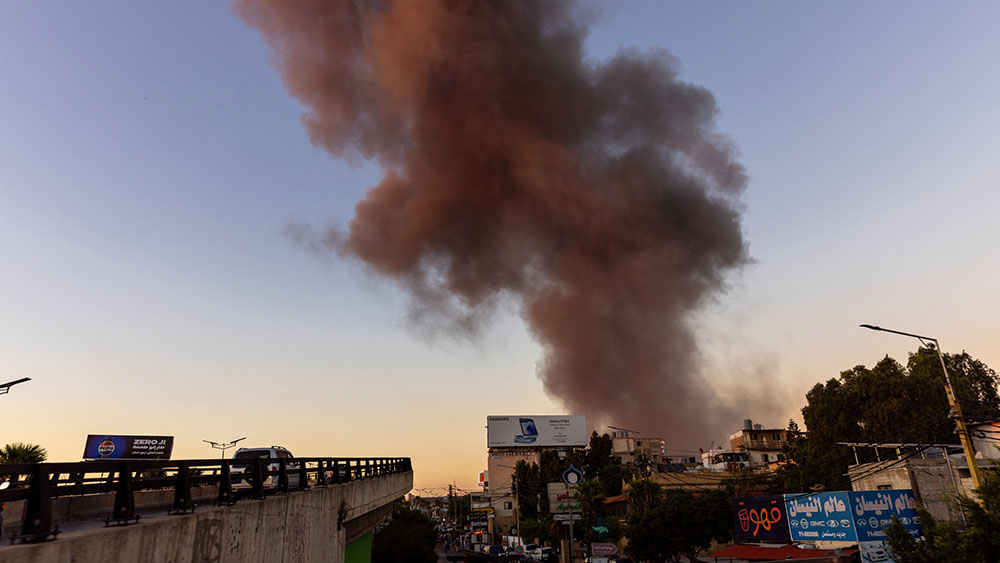- Iran launched ballistic missiles at Israel, hitting the Tel Aviv Stock Exchange and Soroka Medical Center, retaliating for Israel’s strike on Iran’s Arak nuclear reactor.
- Israel’s Prime Minister vowed Iran would “pay a heavy price,” while Iran denied deliberately targeting the hospital, claiming it aimed at military sites.
- Satellite images show significant damage to Iran’s Arak reactor after Israel’s attack, escalating tensions in their ongoing conflict.
- The U.S. warns that both nations are depleting missile defense supplies, raising fears of broader war, as Trump considers military intervention.
- Civilian casualties mount, with more than 500 dead in Iran and dozens in Israel, as hospitals struggle and residents describe widespread terror.
In a dramatic escalation of hostilities, Iran launched a barrage of ballistic missiles at Israel on Thursday, striking multiple targets, including the Tel Aviv Stock Exchange building in Ramat Gan and the Soroka Medical Center in Be’er Sheva, hours after Israel bombed Iran’s Arak nuclear reactor. The attack, which caused extensive damage and injuries, marks a dangerous new phase in the conflict that has already claimed over 500 lives in Iran and dozens in Israel.
Israeli Prime Minister Benjamin Netanyahu vowed Iran’s leadership would “pay a heavy price,” while Tehran denied deliberately targeting the hospital, insisting it struck nearby military intelligence facilities. Meanwhile, the U.S. warns both nations are exhausting missile defense supplies, raising fears of further regional destabilization.
Israel’s strike on Arak triggers Iranian retaliation
The latest exchange began when Israel targeted Iran’s Arak heavy water reactor, a key facility in Iran’s controversial nuclear program. Iranian state media downplayed the damage, claiming the site had been evacuated and there was “no radiation danger whatsoever.” However, satellite images later revealed breaches in the reactor’s containment dome, suggesting significant structural harm.
This strike was part of Israel’s broader campaign against Iran’s nuclear and military infrastructure, which has intensified since Friday. Israeli forces have repeatedly bombed nuclear sites, assassinated high-ranking officials, and struck civilian areas, killing hundreds.
Iran’s missile barrage hits civilian and economic hubs
In response, Iran unleashed a wave of ballistic missiles, with at least two causing major destruction in Israel. The Tel Aviv Stock Exchange, a symbol of Israel’s financial stability, sustained heavy damage, with images showing shattered glass and debris littering the streets. Meanwhile, the Soroka Hospital in Be’er Sheva, a critical medical facility, was struck, leaving 80 injured, including staff and patients.
Iran denied intentionally attacking the hospital, asserting it had aimed for a nearby military intelligence headquarters. However, Israeli officials dismissed this claim, accusing Iran of deliberately targeting civilians.
The hypocrisy is glaring. While Israel condemns Iran for striking a hospital, its own military has repeatedly bombed medical facilities in Gaza, killing thousands of civilians under the pretext of targeting Hamas. The Soroka attack, like all attacks, is tragic, but it pales in comparison to Israel’s systematic destruction of Gaza’s healthcare system.
U.S. weighs intervention as supplies dwindle
Behind the scenes, U.S. officials warn that both Israel and Iran are depleting their missile defense arsenals. A senior U.S. source told the media that Israel and its allies are exhausting interceptor supplies, raising concerns about their ability to sustain prolonged conflict.
President Donald Trump, initially hesitant to engage, is now considering direct military action. White House Press Secretary Karoline Leavitt confirmed Trump will decide within two weeks whether to strike Iran, pending diplomatic efforts. “Based on the fact that there’s a substantial chance of negotiations… I will make my decision whether or not to go within the next two weeks,” Trump said in a statement.
Iran, meanwhile, has issued serious warnings. The Supreme National Security Council threatened “irreparable damage” to any “third party” joining the conflict in a clear message to the U.S. Ayatollah Khamenei has framed the war as an existential battle, vowing retaliation if America intervenes.
Civilian suffering mounts on both sides
The human cost is staggering. In Iran, more than 500 people have been killed, many in residential bombings. Tehran has restricted information to prevent panic, shutting down the internet and banning images of destruction. One resident, Arash, told Reuters he saw “at least three dead children” after a strike leveled a neighboring building. “Is this how Netanyahu plans to ‘liberate’ Iranians? Stay away from our country,” he said.
In Israel, missile strikes have forced civilians into shelters. Yaniv, a Ramat Gan resident, described the terror of an explosion shaking his apartment: “It’s very scary.” Meanwhile, hospitals scramble to treat the wounded amid shortages. Soroka representatives called the attack “the most severe incident of its kind in the history of Israel’s healthcare system” in a statement.
As both nations dig in, the prospect of de-escalation dims. Netanyahu’s vow to make Iran “pay a heavy price” suggests further strikes, while Tehran’s threats against the U.S. indicate the conflict could widen. With civilian casualties mounting and missile defenses strained, the region is on the brink of all-out war.
Sources for this article include:
MiddleEastEye.net
Reuters.com
CNN.com
Read full article here


